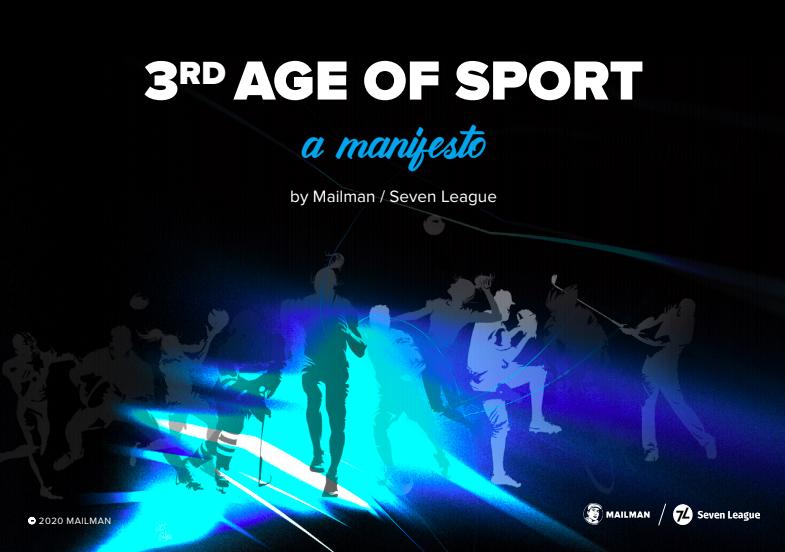Media Rights Reach Peak, Sport’s Napster Moment Moves Industry Into 3rd Age
A recent Seven League study, in which in-depth consultations were held with representatives of tier-1 global sports properties, revealed that 83% believe that media rights have reached a high-water mark. The executives surveyed all have direct experience in rights negotiations and represent both the rights holder and broadcaster sides. Together their properties reach 4 billion sports fans globally. If their view is borne out, this may be sport’s ‘Napster moment’, an inflection point where the industry has to fundamentally address how it’s structured and where it derives its revenues.
Inevitably, sport will fight hard to retain its broadcast revenues, but as it enters its 3rd Age we believe sport will need to adapt from an over-reliance on broadcast fees to become a fully-rounded digital media business, incorporating ecommerce, streaming, ticketing, sponsorship, membership, loyalty and wagering. How each of these business models operate is fundamentally changing, something we call the 3rd Age of Sport.
Andrew Collins, Group CEO, Mailman Group: “While we may have reached Everest with many media and sports properties, international audiences are proving to show sports are increasingly becoming more global and with that presenting new broadcast and digital rights opportunities. Global platforms such as Facebook, YouTube and Twitter have accelerated the need for an international ‘multi-platform, multi-product’ strategy – rights holders who are able to adapt quickly should realise gains.”
The 3rd Age of Sport manifesto, produced by Mailman and Seven League, emphasises how COVID-19 has accelerated the sports industry’s transition into a 3rd age, where digital disruption is having a fundamental impact on every area of the sport business landscape, across content, sponsorship, data, streaming and overall competition for audience attention.
In the first age of sport, industrialisation increased leisure time to enjoy and participate in amateur sport creating a period of recreation and community. In the second age of sport, we built businesses. We charged money for access, we developed sponsorship and advertising offerings, we packaged and sold the rights to view sports, allowing athletes to become professionals and sports to grow. As we enter the third age, digital disruption is restructuring sports consumption and how it’s discovered and monetised. New competitive forces and new distribution media are altering the industry and reshaping the business model for sport, while creating new opportunities elsewhere.
Richard Ayers, Chairman, Seven League: “digital transformation has given Sports the opportunity to go direct to consumer, but the same power has been given to everyone else. Amazon and the other big tech companies are the gatekeepers… Sponsors can be more certain of their ROI by going direct… And those who have the data have the power. Meanwhile, people have become fixated on “owning the audience” when the audience does not want to be owned. Trust is the currency of the future. Sports must master the value exchange, and through that build trust.”
Charlie Beall, Partner, Seven League: “Media rights have been the mainstay of sport’s revenues in recent years, much like physical album sales were for the music industry, until that stopped being the case and that industry needed to go through some painful adaptations. For the big players in sport, media rights are what sustains huge player wage bills as well as an entire ecosystem of people working in the sport industry. These properties will look to, and likely succeed in holding their current values in the short term.
Below them however, is a whole tranche of second and third tier properties that will see revenues from media rights deals being eroded. These revenues have proved vital for the continued sustainability of some sports, and often fund grassroots participation programmes. We think it’s essential that sport, as an industry, acts quickly to diversify its revenues.”
Sport has an important role to play in culture and society. The 3rd age is arguably the most important era for the industry following COVID-19’s impact globally. New playbooks, new audiences, new media will determine how sports is monetised, consumed and enjoyed by all.
Welcome to the 3rd age.
Visit the site & watch the video: https://www.
Est 1999, Mailman Group comprises leading sports digital agency Mailman and award-winning sports consultancy Seven League, with offices in China, UK, Singapore, and the US. Mailman Group helps the leaders in sport build engaged audiences and a sustainable business. With over 200 experts across the globe, Mailman Group delivers tailored social and digital programs that drive consumption and commercial success. Clients include FIFA, NBA, UFC, NHL, NFL, DRL, Panini America, Chelsea, PSG, LA Lakers, New England Patriots, Cristiano Ronaldo, David Beckham, and more.
About author
You might also like
SPORTEL Monaco 2021: CEO Laurent Puons praises event
The second day of SPORTEL 2021 got underway this morning in Monaco. Following on from yesterday’s masterclasses, Wednesday played host to a number of conference talks from industry-leading professionals. The
SPORTEL 2021: Day One Recap
This year’s prestigious SPORTEL convention kicked off in sunny Monaco today, welcoming a host of familiar faces as well as plenty of new ones. Doors opened at 8:30am with businesses
SPORTEL 2021: Monaco prepares to host prestigious October convention
After a one-year hiatus due to the impact of COVID-19, the world-renowned sports media and tech convention, SPORTEL, returns to host its annual event in Monaco. The conference will take








